Is Japan LGBTQIA+ friendly?

LGBTQIA+ travellers are those who identify as lesbian, gay, bisexual or transgender (a more inclusive LGBT initialism), plus queer or questioning, intersex or asexual individuals, as well as those who identify beyond these commonly used sexuality and gender expressions. Specific situations and issues may present themselves to travellers who identify with one or more of these terms when visiting Japan .
LGBTQIA+ travellers are unlikely to encounter violence, outright hostility or overt discrimination in Japan. However, conservative values about LGBTQIA+ sexuality and non-binary gender expression are common, particularly outside large cities. Sex that takes place between consenting adults of the same gender is legal, though same-sex marriage is not. Some districts (such as Tokyo) legally recognise same-sex partnerships. Outside of certain youth-oriented entertainment & and queer neighbourhoods, LGBTQIA+ folks remain somewhat invisible in Japan.
It’s important to keep in mind that public displays of affection are not common in Japan, regardless of sex, gender presentation or sexual orientation.
For more detailed and up-to-date advice, we recommend visiting Equaldex or ILGA before you travel.
Tokyo has the best-established and most diverse LGBTQIA+ scene in all of Japan.
The former red light district of Shinjuku Ni-chome (nicho for short) is now an established LGBTQIA+ neighbourhood. But while the bar and sauna options are plentiful if you're a cisgender gay man, there are only a handful of bars that cater to other identities and orientations. However, many of these establishments are welcoming of all LGBTQIA+ people (plus allies), so this neighbourhood is a great place to head out for a meal, a drink, a dance and a sense of community.
Like Tokyo, Osaka has an established LGBTQIA+ neighbourhood. As with Shinjuku Ni-chome in Tokyo, the vast majority of offerings in Osaka's Doyamacho district are aimed at cisgender gay men. But that doesn't mean other LGBTQIA+ people (and their straight friends) can't get in on the fun. While some of the fancier bars are open only to local men, plenty of the more casual spaces are open to all people of all nationalities sexual orientations and genders.
If you are travelling solo on an Intrepid group tour in Japan , you will share accommodation with a passenger of the same gender as per your passport information. If you don’t identify with the gender assigned on your passport, please let us know at time of booking and we’ll arrange the rooming configuration accordingly. A single supplement is available on some tours for travellers who do not wish to share a room.
Let's create an exclusive trip for your group.
Why train travel is the one experience you won’t want to miss in Japan
Exploring the world through tea
The top 7 destinations for travel in April 2024
10 awesome places to go for your 21st birthday
6 ways you can go beyond Asia’s hotspots in 2023
Japan or China: Where to travel next?
Now is the perfect time to visit Japan. This Intrepid leader explains why.
Japan or South Korea? How to choose your next holiday destination
- Search Please fill out this field.
- Manage Your Subscription
- Give a Gift Subscription
- Newsletters
- Sweepstakes

The Ultimate Japan Itinerary for LGBTQ+ Travelers
A-List travel advisor John Clifford shares an excerpt from a stand-out itinerary to Japan.
:max_bytes(150000):strip_icc():format(webp)/john-clifford-lgbt-destination-ALISTJOHNC0718-2bf0123672ed4fa0851896a11d7a1dc0.jpg)
vladimir zakharov/Getty Images
John Clifford is a member of Travel + Leisure ’s A-List , a collection of the top travel advisors in the world, and can help plan your perfect getaway. Below is an excerpt from one of the many itineraries he creates — in this case, a food-focused sojourn through Japan.
Day 1: Arrival Into Tokyo
After arriving into Tokyo and checking in to the Trunk Hotel , you'll head to a half-day guided tour of the Outer Market and the Ginza shopping area, followed by a ramen dinner tour.
Outer Market
While the wholesale fish market has been relocated to its new Toyosu location, Tsukiji's Outer Market is as busy and bustling as ever. The Outer Market is a mixture of wholesale and retail shops selling everything from carrots to cakes, pottery to kitchen knives. It is also filled to the brim with restaurants serving the freshest sushi and sashimi. In contrast to Toyosu's new ultra-modern facility, Tsukiji's Outer Market retains an essence of traditional charm that makes it well worth a visit.
Manorath Naphaphone/Travel + Leisure
Ginza is Tokyo's most famous upmarket shopping, dining, and entertainment district, featuring numerous department stores, boutiques, art galleries, restaurants, night clubs, and cafes. One square meter of land in the district's center is worth over ten million yen, making it one of the most expensive real estate in Japan. It is where you can find the famous $10 cups of coffee and where virtually every leading brand name in fashion and cosmetics has a presence. From 1612 to 1800, today's Ginza district was the site of a silver coin mint, after which the district was eventually named. Ginza evolved as an upmarket shopping district following the 1923 Great Kanto Earthquake. Most shops in the Ginza district are open every day of the week. If you are feeling a bit hungry, or just interested in food, the depachika (basement floors) of department stores are filled with foods of all kinds. Most are already prepared and ready to take away and eat at home, which is exactly what many people do in order to balance busy work and home lives. A mouthwatering mix of Japanese and western dishes, sweets, and snacks await.
A Ramen Dinner Tour
During this personalized 2-3 hour ramen tour, your expert guide will take you to some of Tokyo's hidden ramen shops for lunch or late afternoon meal. He will take you to two ramen restuarants, one for a thick, rich bowl of ramen and one lighter bowl. Ask him any question about ramen and he will be able to answer. Meet your ramen expert in your hotel lobby.
Didier Marti/Travel + Leisure
Day 2: Touring Tokyo
Your guide will meet you in the hotel lobby for a private vehicle tour of Sensoji Temple and Kaminarimon Gate, and the Nakamisedori Sensoji Temple — possibly one of the most photographed structures in the city. An official temple was built in 645AD, making it not only the oldest temple in Tokyo, but among the oldest in Japan. Sadly, after standing for 1300 years, it fell to the bombings of WWII, only to be rebuilt during the aftermath as a symbol of peace and resurrection to the Japanese people. Today, millions of visitors pass through the Kaminarimon or Thunder Gate annually, known for the huge brightly painted lantern dominating the entrance. Just beyond Sensoji’s Kaminarimon you’ll find yourself on the Nakamisedori, a vibrant shopping street lined with souvenir shops selling everything from Samurai swords to paper fans, and all manner of snacks and trinkets. teamLab Planets One of Japan’s most creative spaces, this art encounter places you within large scale installations that combine digital and physical media. The variety here is impressive, with infinity rooms of digital light, knee-deep illuminated water, and mazelike cavernous halls of huge balloons. There are plenty of memorable surprises in this uniquely Japanese art space – and all highly Instagrammable.
Roppongi Hills
Roppongi Hills is one of the best examples of a city within the city. The building complex in the Roppongi district is home to an amalgamation of offices, apartments, shops, restaurants, a hotel, the Mori Art Museum , a view deck and more. The 238-meter Mori Tower at the center is one of the tallest buildings in the city. Just behind the tower and hotel is Mori Garden, and TV Asahi is also located on the site. The Mori Art Museum, located near the top of Mori Tower, shows innovative exhibitions of international contemporary art. At the heart of Roppongi's arts district, Tokyo Midtown feels almost like a city in itself. Home to a sophisticated mix of shops, galleries, and residences, it is a pleasant area to explore. The main shopping mall features international restaurants, a dining terrace, and a range of stores from everyday essentials to luxury boutiques. The complex also contains many museums and art galleries. Their top floor features interior design and houseware shops as well as the Suntory Museum of Art , a modern space with beautiful city views that displays traditional works.
In the Evening: Shinjuku
Shinjuku is one of the 23 city wards of Tokyo, but is often referred to as the huge entertainment, business, and shopping area around Shinjuku Station. Colorful signs decorate the narrow streets at all stories, blocking out the city sky and filling it with life. More than 2 million passengers go through Shinjuku Station every day, making it the busiest railway station in Tokyo, which effectively makes it the busiest railway station in the world. Shinjuku's skyscraper district is home to many of Tokyo's tallest buildings, including several premier hotels, the twin towers of the Metropolitan Government Office, and is also home to famous game companies, such as Square Enix (right outside Higashi-Shinjuku station).
Dinner at Kaiseki Komuro
Dinner tonight is at Kaiseki Komuro for flavors of cha-kaiseki, a meal served during a traditional Japanese tea ceremony. Since opening in 2000, this two Michelin star restaurant has become a gem for urban gourmands that long to immerse themselves in the beauty of the seasons.
Day 3: Tokyo's Museums and Shopping
Your guide will meet you in the hotel lobby to head to the Nezu Museum , a collection that once belonged to Nezu Kaichiro, an industrialist and former president of the Tobu Railroad. Although he enjoyed everything from delicate calligraphy to Chinese bronzes, the center of the collection concerns “the way of tea.” There are several authentic teahouses scattered throughout the extensive gardens, as well as many lovely artifacts. A collection of painted folding screens in the Rinpa style is not to be missed. The museum’s grounds are a highlight as well. Designed by Kengo Kuma, one of Japan’s brightest architectural stars, the soaring roof and strategic use of glass and steel create a perfect setting for the works within.
Harajuku is the epicenter of Japanese street-fashion and fashion subcultures. The neighborhood's modern identity stems from the post-war history of the area, but its continuous development is heavily reliant on today's youth culture trends. The Harajuku area is divided by a boulevard called Meiji-dori, which separates its two main areas: Takeshita Street and Ura-Harajuku. The side most internationally associated with Harajuku is Takeshita Street, an extremely popular pedestrian street overflowing with fashion boutiques, sweet crepe stands, innovative snack shops, photobooths, and fast food outlets marketed to tweens and teens. Even though many of Takeshita Street's energetic trends are starting cross over to the other side, Ura-Harajuku has retained a more relaxed atmosphere. Its streets lie behind Omotesando and are filled with high-end vintage shops, street-fashion brands flagship stores, privately-owned boutiques, and cafes.
This area of Tokyo is just one station away from busy Shibuya, but has a very different atmosphere, with small high-end boutiques, restaurants and cafés sharing the space with embassies, high-class residential areas, and Hillside Terrace, the symbol of Daikanyama. The laidback vibe and trendy fashion found here has made it a hot spot among the hip crowds of Tokyo but remains a pleasant counterpart to the busy streets of Shibuya.
karimitsu/Getty Images
Tempura Cooking Class
This private cooking lesson from the head chef of one of Tokyo’s best tempura restaurants is the ideal way for travelers to experience Tokyo gastronomy at its finest. The tempura restaurant is located inside a former geisha house in a historical Tokyo district. You will learn cooking techniques from the head chef himself, and explore this Japanese specialty’s rich history by tasting and comparing Edo-period vs. contemporary tempura. As part of the class, participants enjoy a full course meal with a sake pairing personally selected by the chef.
Dinner at Sushi Saito
Chef Takahashi Saito is at the helm at this restaurant with 3 Michelin stars and near impossible to get seating. Booked in The Private Room, you will enjoy such delicacies as bonito sashimi, tender simmered octopus, kuruma-ebi shrimp, and more.
Day 4: Taking in Hakone
You'll take a bullet train to Kyoto, where you'll be staying at the Hakone Retreat Villa . Your guide will take you to the Old Tokaido road, a highway which once linked Tokyo and Kyoto during the feudal Edo Period. Today, you can enjoy a beautiful cedar-lined passage of the road along the shore of Lake Ashinoko. Even a short walk down the cobbled highway for a few minutes is a wonderful way to immerse yourself in the nature and history of the area. Visitors desiring a longer walk can continue deeper into the mountains towards the restored Amazakechaya Teahouse .
Hakone Shrine
Hakone Shrine stands at the foot of Mount Hakone along the shores of Lake Ashi. The shrine buildings are hidden in the dense forest but are well advertised by its huge torii gates, with one standing prominently in the lake and the other two over the main street of Moto-Hakone.
Hakone Open Air Museum
The Hakone Open Air Museum is a harmonious mix of nature and art. This museum allows visitors to experience the beautiful mountainous backdrop of Hakone while viewing numerous sculptures and art exhibits spread out across the museum’s grounds. The main building of the museum features works by various artists including Picasso.
Kaiseki Dinner at Nijo Yamagishi
Born from the near impossible-to-book the kaiseki favorite Tominokoji Yamagishi, Nijo Yamagishi is a chance to enjoy premium quality in a more casual setting, with hot pot cuisine from an exciting young chef.
tekinturkdogan/Getty Images
Day 5: Kyoto
You'll transfer for a stay at luxury royokan Yoshida-Sanso , the historical university villa of Prince Higashifushimi, then explore Gion. Gion is Kyoto's most famous geisha district located near Maruyama Park. The district has a number of traditional machiya townhouses where geisha and maiko (apprentice geisha) enter and exit in the evening when entertaining guests. Lucky visitors might catch a glimpse of a geisha on her way to her next appointment.
Tea with Maiko
Enjoy tea, conversation, and a short performance from one of the few professional maiko (geisha-in-training) still active in Kyoto. The teenage maiko will explain in detail about her life and what it takes to become a geisha – a rare opportunity that many travelers never have a chance to experience. This unique meeting is a great way to enjoy geisha culture in the former capital of Kyoto. You can take a photo with the maiko as well.
Dinner at Gion Nishikawa
Michelin-starred chef Masayoshi Nishikawa crafts unique, seasonal kaiseki dishes at this outstanding restaurant , and offers vibrant counter seating to interact and watch the chef's magic.
AwOiSoAk/Getty Images
Day 6: Temples and Culture in Kyoto
The Otagi Nenbutsuji Temple is one of Kyoto’s hidden gems due to its isolated location and a unique display of Buddhist art. Although the roots of this temple go back to the 8th century, the current grounds were revitalized in the modern era by Kocho Nishimura, a respected Buddhist artist and priest. In the 1980s, he invited worshippers to this small mountain temple to learn the techniques of stone carving to create 1,200 rakan (a disciple of Buddha) statues that are now on display at the temple. No two statues are the same, with many depicting lighthearted and comical features that you rarely find in Buddhist art. From singing priests and parents cradling babies to acrobats and surfers, all walks of life are present in stone at Otagi Nenbutsuji. Nishimura’s family continues to care for the temple and carry on his legacy of blending personal expression through art with the teachings of the Buddha.
Saga-Toriimoto Street
One of Kyoto’s best-kept secrets is this quiet district tucked away in the hills on the western rim of the city. A long street runs through a preserved village with rows of charming wooden houses below forested slopes. This is a rare chance to see a grouping of original thatched roof houses so close to the city. Many of these farmhouses are from the Meiji-era (late 1800s/early 1900s) and remain in their original state. At the top of the street is a lovely traditional teahouse with a mossy thatched roof and impressive torii gate. Along the road are several quaint shops selling regional crafts, including bamboo goods, pottery, and whimsical local folkart made from the cocoons of silkworms.
Arashiyama Bamboo Grove
The walking paths that cut through the bamboo groves make for a nice walk or bicycle ride. The groves are particularly attractive when there is a light wind and the tall bamboo stalks sway gently back and forth. The bamboo has been used to manufacture various products, such as baskets, cups, boxes and mats at local workshops for centuries. When you stop for lunch at Izusen Enjoy, you'll enjoy traditional vegetarian Buddhist cuisine ( shojin-ryori in Japanese) in a charming space on the backstreets of the quiet Sagano district. The vegetarian fare is sure to delight and surprise both your tastebuds and eyes.
Okochi Sanso Villa
This samurai-style villa is the former home and garden of the famous Japanese film actor Denjiro Okochi (1898-1962), known for his roles are fierce samurai in the early silent film days. The beautiful garden is dotted with rustic teahouses and hidden pathways that open onto expansive city views. One of the best spots for early autumn leaves in Arashiyama, the villa also has a rest area where matcha tea and unique sweets are served.
gyro/Getty Images
Kinkakuji Temple
Perhaps best known in English as the “Temple of the Golden Pavilion,” this icon of Kyoto rises above a quiet reflecting pond, shimmering in its layers of gold leaf regardless of the weather. A remainder of a former villa of the Shogun, the pavilion successfully incorporates three distinctly grand architectural styles: Shinden, Samurai, and Zen. Rebuilt in the mid-20th century, Kinkakuji remains the epitome of Kyoto's gilded past as the cultural capital of the nation. The layout of the garden is based on ancient Chinese writings, and the stones of the main pond serves as a representation of the Japanese islands themselves. As a whole, the entire landscape serves as a fine example of the magnificent villa that once occupied this space.
Candlelit Tea Ceremony and Ritual
As dusk falls and the city begins to settle, enter the traditional home of our in-house tea expert for a special experience. Candles light your way through the garden as you remove your shoes and step into a charming tea room. This special ocassion is multifaceted and focuses on more than just tea. You’ll begin with a glass of local sake paired with two light seasonal foods as a way to better understand the culinary culture of Kyoto. Purified by the sake, you are ready to move on to the main event: an informative tea ceremony served with sweets. Your host will explain the meaning behind the ritual and how it ties to both the mundane world and the spiritual realm. This is an ideal pre-dinner activity to whet the appetite and learn about an important element of Japanese culture.
Dinner at Restaurant Gion Sasaki
Praised as “Sasaki Theater,” this one-and-only Japanese restaurant has become a long-run hit on the old strip of Gion. With charisma and passion, Chef Hiroshi Sasaki has transformed his kitchen into a stage where he performs a new kind of culinary entertainment, packed with fun and surprises.
To work with John or to read the complete version of his Japan LGBTQ+ culinary adventure itinerary, contact him at [email protected] .
Related Articles
Life in Japan for a Trans Woman
Discussions around sexual and gender rights are becoming more and more prevalent in Japan, and transgender rights are right at the center. We were fortunate to talk with Selina Provias, who came out as transgender and underwent hormone therapy in Japan, to learn about her experiences and how they have affected her work and personal life here.
Tell us about your experience coming out in Japan.

When I moved to Japan in 2011 I still identified as a gay man. Although I was openly gay, I only came out at work when the timing was appropriate—I never lied about having a boyfriend, but I also didn’t mention it unless someone brought it up. Nonetheless, I generally had a positive experience, both in and out of the workplace. While my company, at the time, didn’t include any LGBT issues in its policies, I always felt safe and able to speak up if I felt I was being treated unfairly. Perhaps because I chose my battles carefully, no one ever disagreed with me when I did speak up on LGBT issues. In my daily life, I felt very safe. And though I rarely held hands with my partner in public, I never felt at all threatened being with him.

In 2015, I came out as transgender and began medically transitioning. After getting some guidance from other English-speaking members of the LGBT community, I was able to obtain a medical certificate from a Japanese psychiatrist confirming my “diagnosis”* as transgender. Once I had that, I was able to begin hormone treatment relatively easily (although not cheaply), and I also approached my company with this matter. *Identifying as transgender Japan is classified as gender dysphoria, or gender identity disorder, under the blanket of "Mental Health and Behavioral Disorders" and must be confirmed by a doctor.
- www.buzzfeed.com
How did your company respond?
I had prepared by doing research on large global companies with some of the most LGBT-friendly HR policies and also found some articles on Japanese people who had successfully transitioned with the support of their employer. I provided this information to my HR department and they started working toward amending their HR policy to be LGBT-friendly and protect members of staff like myself, allowing me to transition without any risk to my employment. When I finally started my RLE (Real Life Experience) living full-time as the gender I identify as, I had an experience that most transgender people outside of Japan, especially trans women, would consider quite privileged. People at work were accepting, if not fully supportive, and, aside from a couple of unintentionally offensive remarks, I’ve generally been treated the same as any other woman at work.
And outside of work? How is society here in general?
Outside of work, I’ve also had a mostly positive experience, although this may be partly due to my Japanese ability, which is still rather lacking. While I have been stared at and even laughed at, I’ve only had one experience where someone was openly aggressive towards me—and this man happened to be American, not Japanese. One other particularly upsetting occasion was when a family with a teenage son decided to stare and laugh at me. The person who initiated this was, surprisingly, not the son but the mother, who prompted her husband to stare and laugh and thus led their son by example. This incident really upset me at the time and I remember tears rolling down my face while they continued to point and laugh, particularly knowing that parents should know better and teach their children how to be better people.
Overall however, my experience has been fairly positive. I recently started dating again and while many straight men are ashamed to admit they are attracted to a trans woman, I have also had some positive examples of straight men who are completely comfortable being around me or even on a date with me, regardless of what people might think. It is a well-known fact that the stigma of being attracted to transgender women is often what pushes some men to murder them (more on issues affecting transgender people can be read here ). My experiences in Japan, however, show promise of a better and brighter future where people like me can live their lives the same as anyone else.

This website uses cookies.
- Travel Trade
- Meetings & Events
- Netherlands
- Select Language 简体中文 繁體中文(香港) 繁體中文(臺灣) India (English) Bahasa Indonesia 한국어 ภาษาไทย Tiếng Việt Singapore (English) Philippines (English) Malaysia (English) Australia/New Zealand (English) Français Deutsch Italiano Español United Kingdom (English) Nordic countries(English) Canada (English) Canada (Français) United States (English) Mexico (español) Português العربية Japan(日本語) Global (English)
- India (English)
- Bahasa Indonesia
- Singapore (English)
- Philippines (English)
- Malaysia (English)
- Australia/New Zealand (English)
- United Kingdom (English)
- Nordic countries(English)
- Canada (English)
- Canada (Français)
- United States (English)
- Mexico (español)
- Global (English)
- Fujiyoshida
- Shimonoseki
- Ishigaki Island
- Miyako Island
- Kerama Island
- Tokyo Island
- Koka & Shigaraki
- Hida Takayama
- Ginza, Nihonbashi
- Beppu & Yufuin (Onsen)
- Ginzan Onsen
- Nagasaki Islands

- Kumano Kodo
- Shikoku Karst
- Amami Oshima
- Hachimantai
- Omihachiman
- Aizuwakamatsu

- Diving in Japan
- Skiing in Japan
- Seasonal Flowers in Japan
- Sustainable Outdoors
- Off the Beaten Track in Japan
- Scenic Spots
- World Heritage
- Home Stays & Farm Stays

- Japanese Gardens
- Japanese Crafts
- Temple Stays
- Heritage Stays
- Festivals and Events
- Theater in Japan
- Japanese Tea Ceremony
- Cultural Experiences in Japan
- Culture in Japan

- Local Cuisine Eastern Japan
- Local Cuisine Western Japan
- Local Street Food
- Japan's Local Ekiben
- Japanese Whisky
- Vegetarian and Vegan Guide
- Sushi in Japan Guide
- Japanese Sake Breweries

- Art Museums
- Architecture
- Performing Arts
- Art Festivals
- Japanese Anime and Comics
- Japanese Ceramics
- Local Crafts

- Scenic Night Views
- Natural Wonders
- Theme Parks
- Samurai & Ninja
- Iconic Architecture

- Wellness Travel in Japan
- Japanese Ryokan Guide
- A Guide to Stargazing in Japan
- Relaxation in Japan
- Forest Bathing (Shinrin-yoku)

- Experiences in Japan
- Enjoy my Japan
- National Parks
- Japan's Local Treasures
- Japan Heritage
- Snow Like No Other
- Wonder Around Japan

- Visa Information
- Getting to Japan
- Airport Access
- COVID-19: Practical Information for Traveling to Japan
- Anime Tourism
- Countryside Stays
- Accessible Tourism
- Hokkaido Great Outdoors
- Scenic World Heritage in Tohoku
- Shikoku’s Nature and Traditions
- Southern Kyushu by Rail
- Tour Operator Search

- Traveling by Rail
- How to Travel by Train and Bus
- JR Rail Passes
- Scenic Railways
- Renting a Car
- Sustainable Travel in Japan
- Travel Brochures
- Useful Apps
- Online Reservation Sites
- Eco-friendly Accommodation
- Luxury Accommodations
- Traveling With a Disability
- Hands-free Travel
- How to Book a Certified Tour Guide
- Volunteer Guides
- Tourist Information Center

- Japanese Manners
- Spring in Japan
- Summer in Japan
- Autumn in Japan
- Winter in Japan
- Cherry Blossom Forecast
- Autumn Leaves Forecast

- Japan Visitor Hotline
- Travel Insurance in Japan
- Japan Safe Travel Information
- Accessibility in Japan
- Vegetarian Guide
- Muslim Travelers
- Safety Tips

- Browse All Inspiration
- Japan Fan Newsletter
- Food & Drink
- Life in Japan
- Japan in the UK/IRE
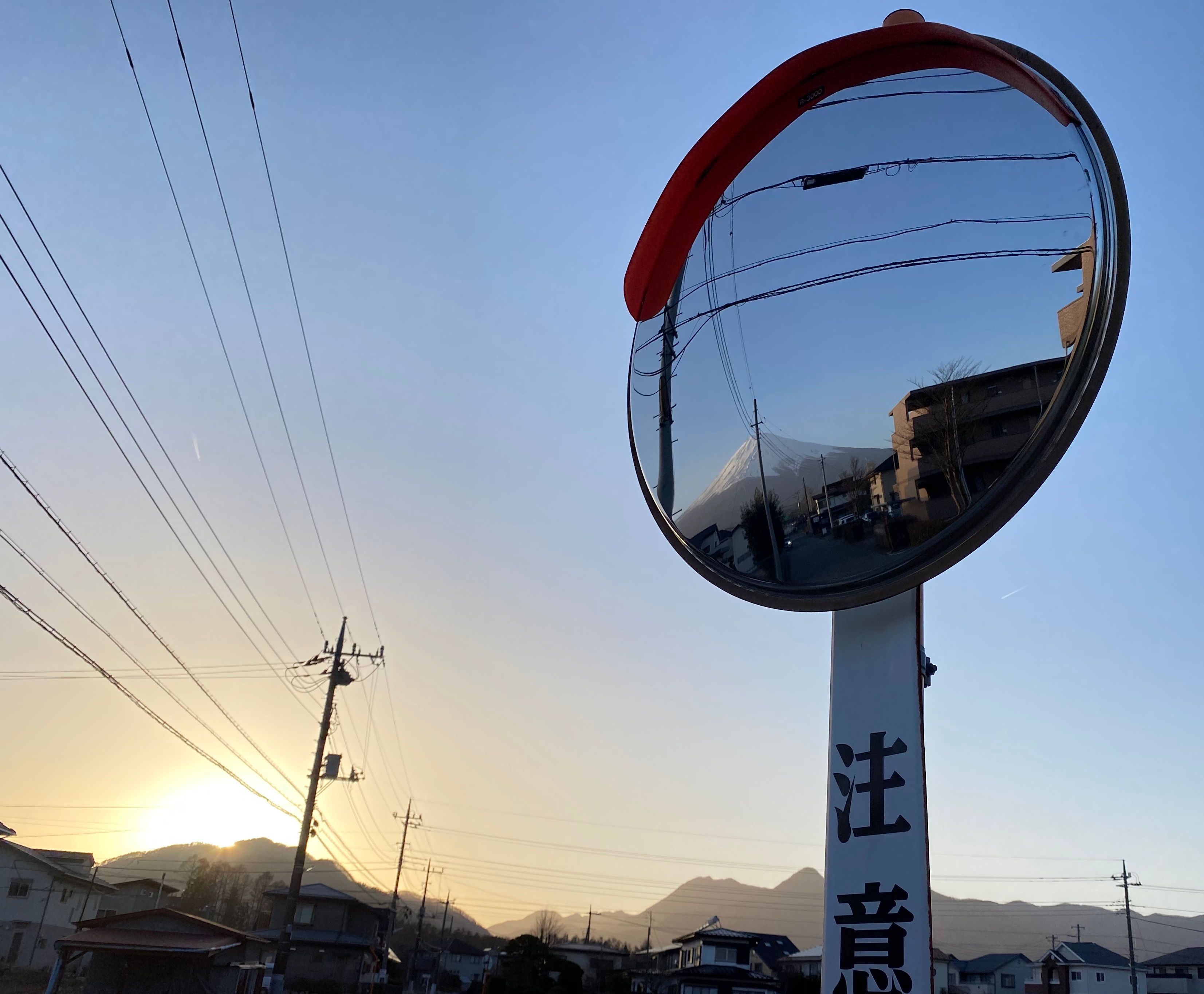
My Favorites
${v.desc | trunc(25)}
Planning a Trip to Japan?
Share your travel photos with us by hashtagging your images with #visitjapanjp

LGBT Friendly Japan
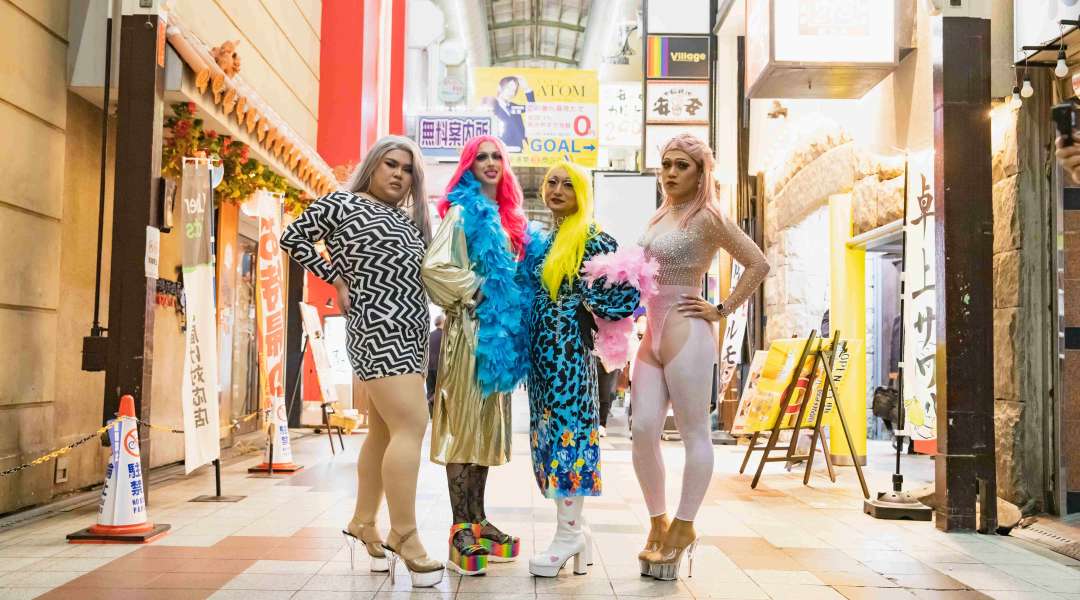
Winds of positive change are blowing in Tokyo as it was announced that from November 2022 a new system that legally recognises same-sex partnerships will be introduced in the metropolis. More details are to come but opinion surveys have shown a great deal of approval for this change on the ground, which is great for LGBTQ+ people both in Japan and visitors coming from abroad. According to Marriage for All, currently over 40% of the Japanese population lives in areas where same-sex partnerships are accepted and partnership systems are being introduced by nearly 140 local governments.
In Japan, public displays of affection of any kind are generally frowned upon but as long as you’re mindful of Japanese culture , LGBTQ+ visitors have little to worry about! Just as with anywhere, there are inevitable differences in levels of familiarity between the modern cities and the more traditional countryside areas but that's in no way to say that LGBTQ+ visitors should avoid going off-the-beaten-path, and we have some great examples to share below! Here are some key bits of information for LGBTQ+ travellers, and our favourite places to visit offering incredible experiences .
Tokyo Gay Scene
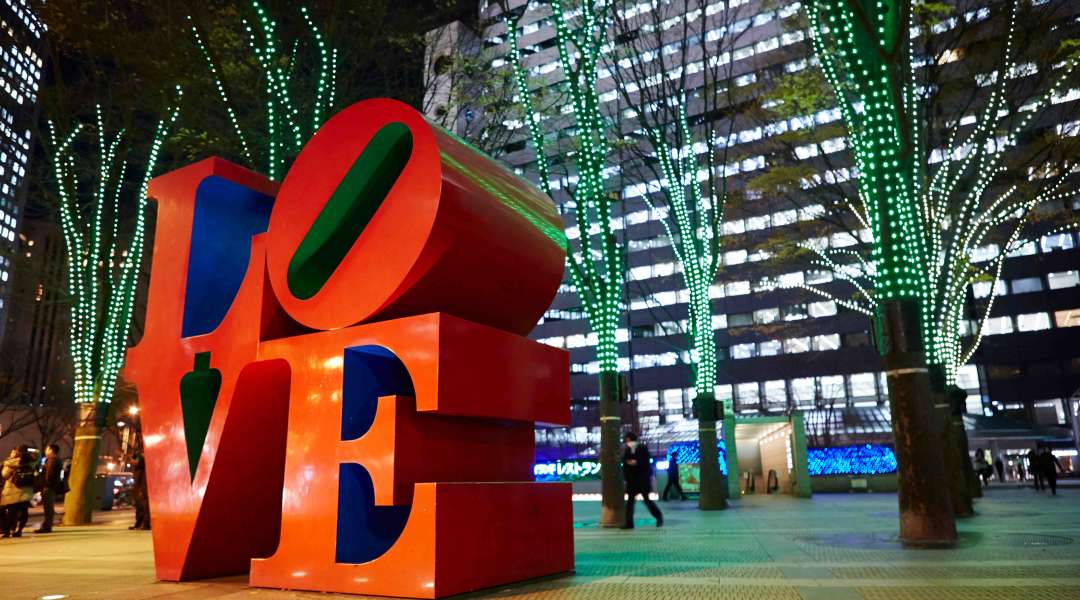
Tokyo, unsurprisingly, rules the roost with its wide array of must-see attractions on offer for LGBTQ+ tourists. One of them is the hub of Japanese queer nightlife, the area of Shinjuku called Ni-Chome . Based along a long strip of road, it may look unassuming but is actually filled with over 400 nightclubs, bars and facilities catering specifically to LGBTQ+ audiences, with a warm sense of community. Places like Goldfinger, Dorabune, or Adezakura are popular lesbian bars; Aiiro Cafe Bar, Arty Farty, and Campy! Bar are hip destinations for men, and FTM Bois Bar is a much-loved space for the trans community. Our interview with Kat Joplin, a drag performer from Tokyo , is a must-read for anyone planning a visit and wanting to get an idea of the dos and don'ts.
Shinjuku is also home to Japan’s first permanent LGBTQ+ centre ‘ Pride House ’ which was opened to create a space where everyone can feel welcome regardless of their sexuality, as a part of the legacy of the 2020 Tokyo Summer Olympics and Paralympics. The 20202 summer games were dubbed the ‘Rainbow Olympics’ for the record breaking number of LGBTQ+ athletes participating in them!
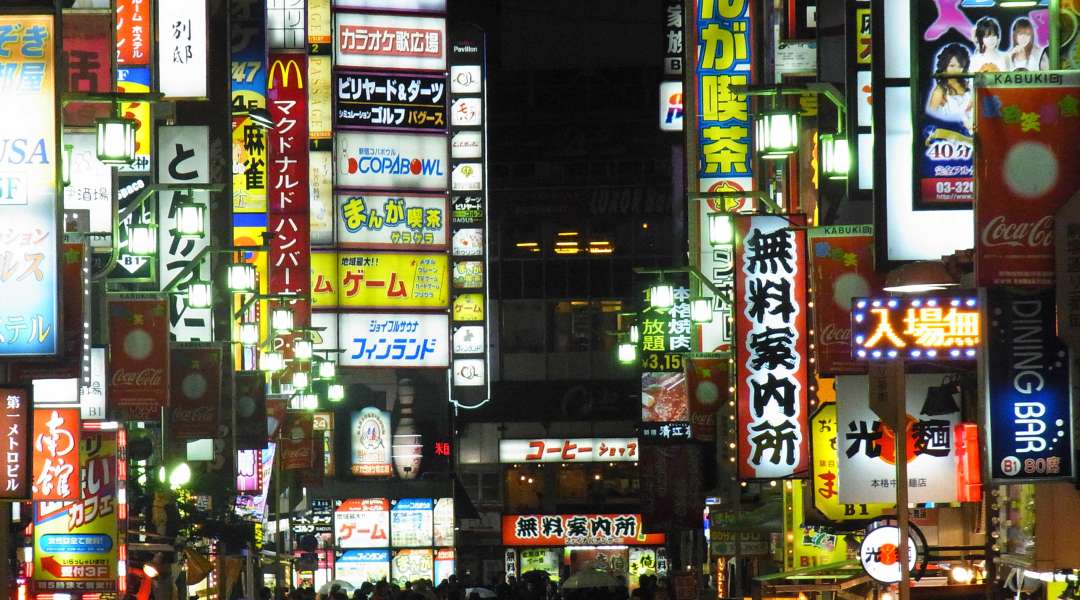
Tokyo is also where you can join Japan’s biggest Pride celebrations, Tokyo Rainbow Pride . Last year it was held online but it’s usually on a weekend in the second half of April with pride week following. Parade participants dress up and march or travel on floats while performances, food stalls and activity booths spill into Yoyogi Park. You can find out more information about next year’s event closer to the date on their website.
Visitors to Tokyo in the second half of July can enjoy the Rainbow Reel Tokyo, International Lesbian & Gay Film Festival which has been an important cultural event since its establishment in 1991!
In Tokyo, there is also an LGBTQ+ tour operator called Out Asia Travel which offers a variety of fun tour packages that will leave you without a worry.
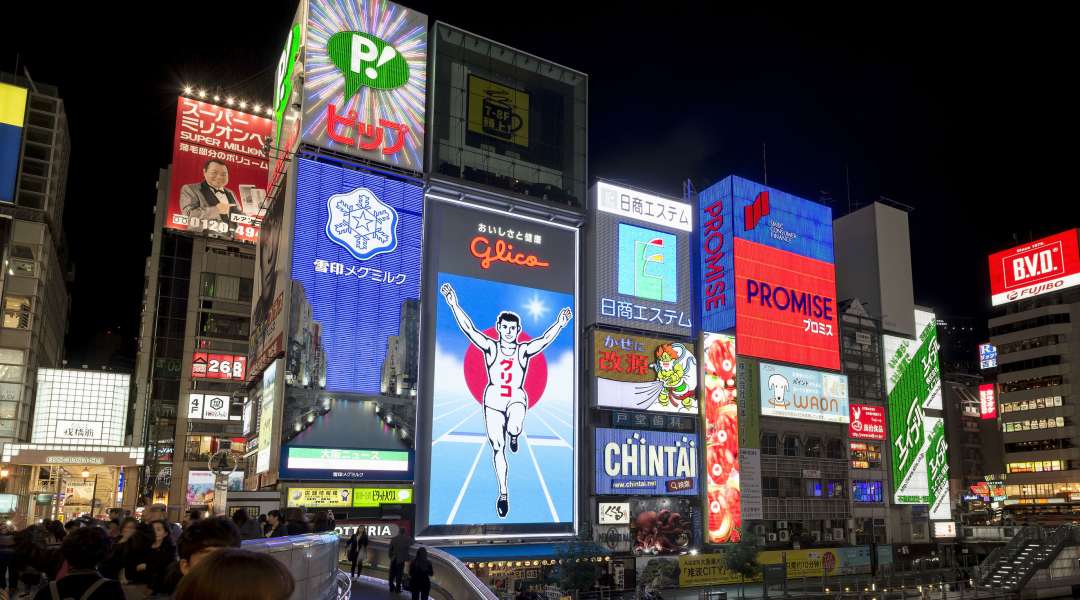
Osaka is a city where you can find it all. Known for its laid-back culture, friendliness, and playful sense of humour, the leading LGBTQ+ friendly city in Japan, Osaka , was announced as a Featured Destination by the International LGBTQ+ Travel Association in 2021 . Visit Gay Osaka was created to develop unique experiences focused around sustainability, diversity, and vitality with the aim of making Osaka an LGBTQ-friendly space for visitors. The local gay district, Doyama, with its bars, clubs, and vibrant nightlife - especially recommended on weekends, is a proof of that. From Visit Gay Osaka’s beautiful promotional video , to Osaka Convention & Tourism Bureau's recently launched a series of experiences that visitors can enjoy in the company of gorgeous Drag Queens, Osaka has something for everyone.
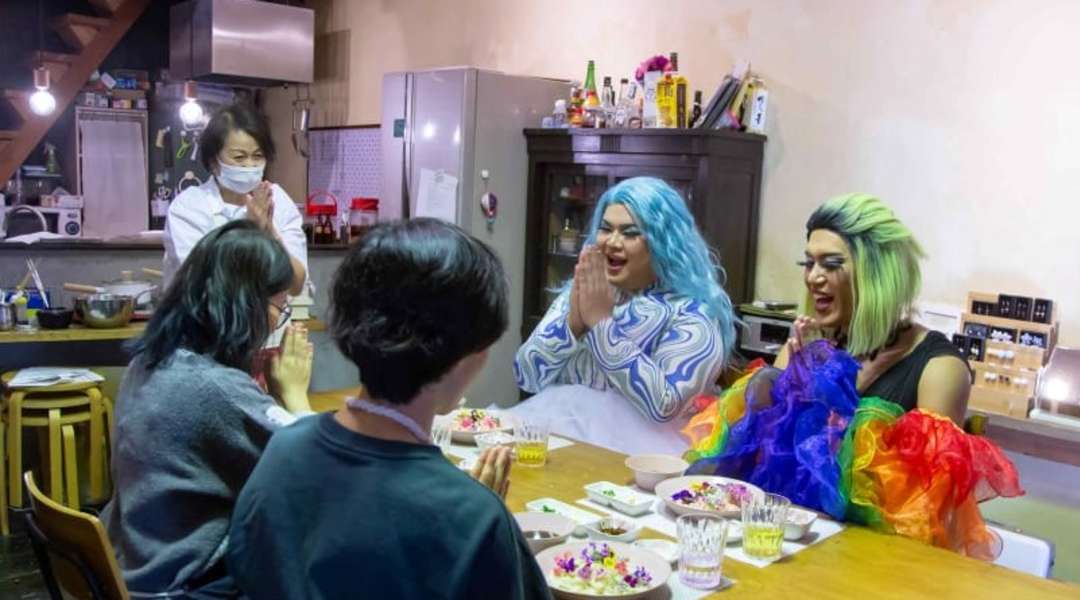
Planning to visit Osaka’s gay bars but you don't know where to start? An English speaking guide will take you to some of the best gay bars around where you can enjoy drinking in the company of Drag Queens. How about making delicious Udon noodles? Let Drag Queens be your assistants as you cook one of Japan’s most beloved dishes. Of course, you can also experience dressing up as a Drag Queen yourself! After being expertly dressed by professional Drag Queens, you can enjoy visiting and taking photos at some of Osaka’s iconic sights alongside your newfound Drag Queen friends. Osaka’s dazzling Drag Queens are waiting for you!
You can check out different tours on their website here .
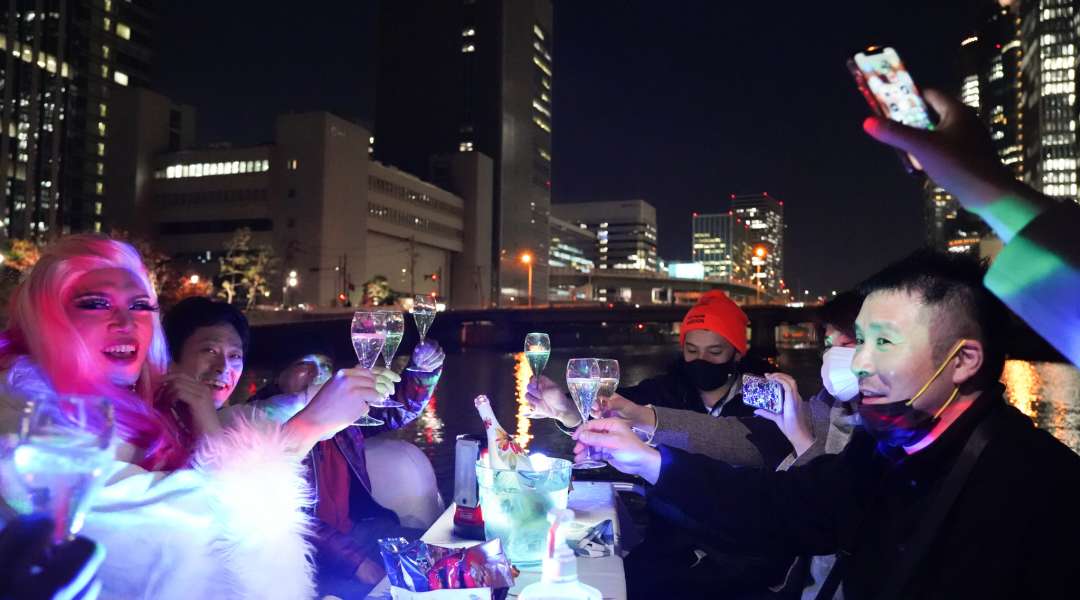
Kansai Rainbow Festa and Parade has been held yearly since 2006 and is a major event taking place in Ogimachi Park . Last year it was moved online and took place on the second Saturday of October but make sure to check out their website for future events.
Off the Beaten Track
LGBTQ-friendly facilities aren’t limited to Japan's cities - they can be found nationwide in some of the most unexpected places like the mountainous wilds of the UraBandai region in Fukushima! UraBandai is an area of natural beauty popular for its skiing infrastructure and its multicoloured lakes. That’s where you can find Bandai Lakeside Guesthouse , run by Genta and his partner. Genta worked for a local ski resort for 11 years before starting his own guesthouse in 2018, but still regularly helps out with the annual Rainbow Ski Weekend , for all the powder hounds out there. Read more about the story behind the Bandai Lakeside Guesthouse here .
Onsen Hot Spring Solutions
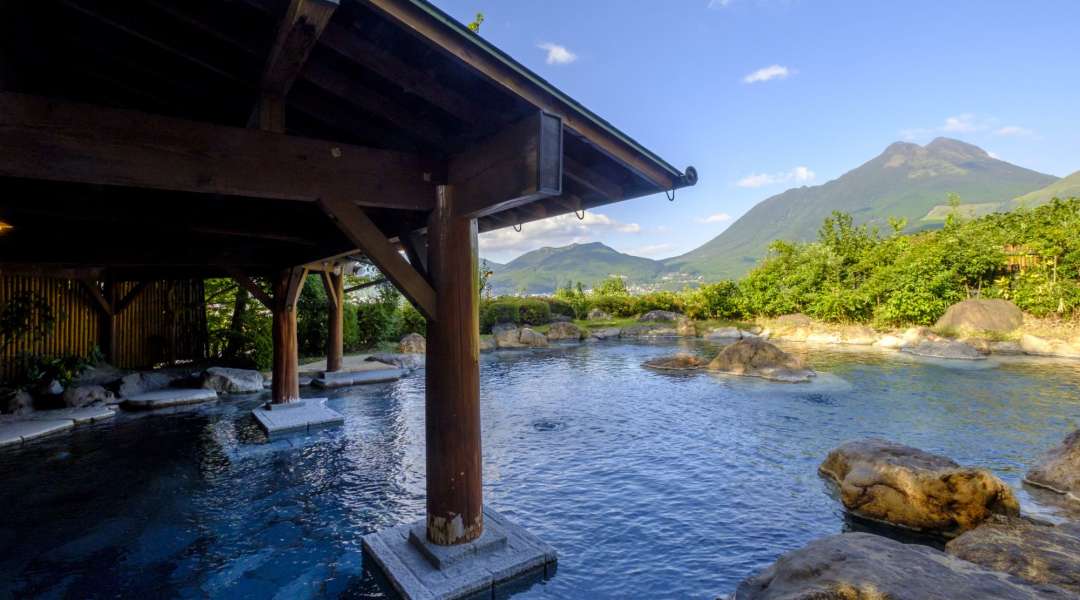
One of the most enjoyable parts of visiting Japan are its relaxing onsen hot spring baths. However, the culture around many shared public onsen still generally asks that bathers, including international visitors, bathe completely nude and use either a men's or women's baths. That’s why in 2018 ‘Japan’s hot spring capital’, Beppu in Oita prefecture, held consultations to discuss different opportunities for making their hot springs more inclusive . It marks a positive move towards an even more inclusive future but, for anybody feeling anxious about the onsen experience, some of the best alternatives for now are to rent a room with a private bath or go for an establishment which allows you to book their facilities for specific times . You can find more information about Japanese hot spring culture and the many different options available to you here .
Japanese manners and hospitality are such that, while exploring Japan, you'll be very unlikely to have any negative experiences relating to gender and sexuality, and you're bound to come across LGBTQ-owned business during your time there.
In fact, beyond simply Tokyo and Osaka are cities in healthy posession of lively and prominent LGBTQ+ scenes , from the incredibly welcoming northern city of Sapporo with its Susukino night district, through to sun-soaked Fukuoka 's Sumiyoshi district, and the ancestral heart of Japan itself, Kyoto .
- Life in Japan (111)
- Media (110)
- Nature (101)
- Outdoor (86)
- Tradition (85)
- Cities (44)
- Food & drink (44)
- Women in Japan (41)
- Culture (39)
- Spring (36)
- Winter (36)
- Autumn (36)
- Summer (33)
- Adventure (31)
- Things to do (28)
- Relaxation (28)
- Traditional (25)
- Japan in the UK/IRE (18)
- Family (18)
- City life (11)
- Local Guides (10)
- Cuisine (8)
- Hokuriku Shinetsu (7)
- Hokkaido (4)
- Articles (4)
- Shikoku (2)
- Outdoor (2)
- Chugoku (1)
- Hokuriku Shinetsu (1)
- Festivals (1)
- Cuisine (1)
- Postcards from Japan (1)
- Previous Article
- Back to Overview
- Next Article
- Inspiration
Please Choose Your Language
Browse the JNTO site in one of multiple languages
- Account Details
- Newsletters
- Group Subscription
Japan's LGBTQ rights progress with Tokyo's new partnership system
Certificates lack legal binding; advocates still call for marriage equality
TOKYO -- The waterfront Rainbow Bridge in Tokyo was lit up in its eponymous colors this week to mark another milestone for LGBTQ rights in Japan.
The Japanese capital began accepting applications on Tuesday from LGBTQ couples to recognize "oaths of partnership" and will start issuing recognition certificates from Nov. 1. The system applies to transgender and non-binary individuals as well as same-sex couples, but is not legally binding.
Strings pulled: Dissecting Japan's Unification Church problem
Singapore declines to follow taiwan, thailand on lgbt+ rights, lgbt+ south koreans gird for christian protests at pride event, thai banks give nod for home loans to lgbtq+ community, singapore's attempt to balance repeal of anti-gay law hurts all, japan's slow shift on lgbt+ rights under scrutiny as election nears, lgbt+ in afghanistan live in fear of taliban crackdown, lgbt+ rights in asia: small steps forward and big steps back, latest on society, $20,000 annual pay: japan's weak yen drives away asian talent, japan's fertility rate sank to record low in 2023: estimate, nepal media group chief arrested over citizenship card issue, sponsored content, about sponsored content this content was commissioned by nikkei's global business bureau..
Nikkei Asian Review, now known as Nikkei Asia, will be the voice of the Asian Century.
Celebrate our next chapter Free access for everyone - Sep. 30
Your browser is not supported for this experience. We recommend using Chrome, Firefox, Edge, or Safari.
- About IGLTA
- Privacy Policy
Plan your trip with IGLTA’s NEW LGBTQ+ Travel Guides
Where will you travel next? Check out the series of LGBTQ+ Travel guides featuring more than 25 countries around the world
Experience Europe’s Best Pride Celebrations with 18-35s
Secure your spot on the summer’s hottest Pride parties
Explore Our International LGBTQ+ festivals & Events calendar!
Celebrate your LGBTQ+ pride year-round!
Choose travel. Choose flexibility. Choose a FREE $150* travel voucher.
At Costsaver Tours they know life is about the choices you make, so their tours give you the power to travel how you choose. Choose to explore now, choose Costsaver.
Discover how Wes Anderson reimagined a vintage train carriage of the British Pullman, A Belmond Train.
Reimagining A British Icon
Love where you travel
Travel guides, events, tours, specials & more.
IGLTA was founded in 1983 and is the world's leading network of LGBTQ+ welcoming tourism businesses. We provide free travel resources and information while continuously working to promote equality and safety within LGBTQ+ tourism worldwide. IGLTA's members include LGBTQ+ friendly accommodations, transport, destinations, service providers, travel agents, tour operators, events and travel media located in over 80 countries.
Get the latest LGBTQ+ travel news plus discover tours, events and special offers.
Featured partners, upcoming events.
ADVERTISEMENT
Upcoming Tours
From the iglta blog, do you remember your first time.
- 4 minute read
Italy, a country renowned for its rich history, art, and impeccable cuisine, also holds a special allure for the…
A New Dawn of Love: Celebrating Thailand’s Leap Toward Equality
- 2 minute read
Thailand, long known for its breathtaking landscapes and warm hospitality, has also become a beacon of progress for…
Historic Boston: A Walker’s Paradise — Your B Town Weekend
- 6 minute read
By Bill Malcolm* (he/him) Historic Boston makes for a perfect weekend. The city is so walkable (and has such great…
Celebrate West Hollywood’s 40-Year Rich History of LGBTQ+ Advocacy for 40 Days of WeHo Pride
West Hollywood’s vibrant LGBTQ+ community, inclusive atmosphere and rich queer-rights history make it the…
Advancing LGBTQ+ Travel
IGLTA, the International LGBTQ+ Travel Association was founded in 1983 and is the world's leading network of LGBTQ+ welcoming tourism…
Travel Guides
Tour operators, accommodations, lgbtq+ safety guide.
- Tours & Experiences
- Tailor-made Trips
- Bahasa Indonesia
We are happy to see you again!
Continue with
Or use email.
No Account? Create one
Create account
Already have an account? Sign in
Quickly Sign up with
I agree to Japan Travel's Terms of Service and Privacy Policy . Terms of--> and acknowledge that Japan Travel's Privacy--> applies to me.-->
Email reset password link
Please check your inbox and click the link we will send to you.

About topic
All things LGBT in Japan.

"Discover. Tokyo" at WOMB 2022
On September 18th (Sunday, the day before the national holiday), "Discover. Tokyo", a new party combining fashion, culture, and..
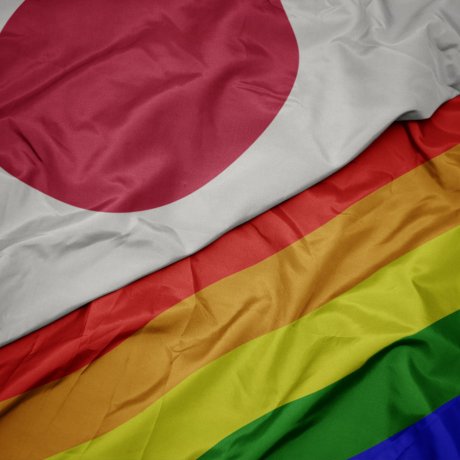
LGBTQ Travel in Tokyo
Where to go, where to stay, and when to visit info for LGBTQ people.

Tokyo Rainbow Pride 2025
Every year, Yoyogi Park transforms for one week into a rainbow of colors as diversified as the people it represents.
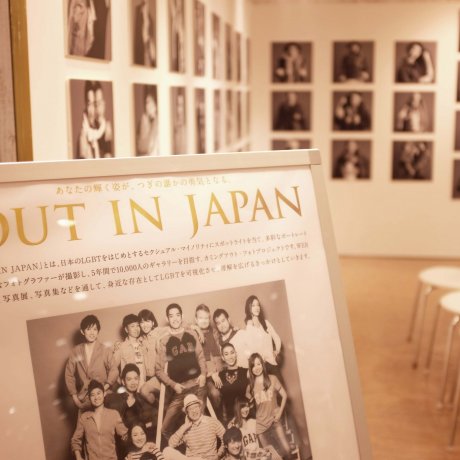
Out in Japan
The 5th floor of Shibuya O1O1 is currently hosting an exhibit on the LGBT community in Japan.
Explore topics
Let us know how we can help.
Advertisement
Supported by
Transgender Ruling Is Step Forward for L.G.B.T.Q. Rights in Japan
The Supreme Court declared unconstitutional a legal clause requiring transgender people to undergo sterilization to legally change their gender identity.
- Share full article

By Hikari Hida and Motoko Rich
Reporting from Tokyo
Japan’s Supreme Court ruled on Wednesday that requiring transgender people to undergo sterilization in order to legally change their gender identity is unconstitutional, a step forward for L.G.B.T.Q. rights in a nation that has been slow to recognize them.
In the unanimous decision, the court said that a legal clause forcing the plaintiff, a transgender woman, to be sterilized before changing her gender on the all-important Japanese family registry certificate “restricted her freedom not to harm herself against her will.”
Still, the court did not rule on a separate requirement that transgender people must undergo transition surgery in order to legally register as the gender with which they identify. In practice, that means many transgender people will still be unable to make the legal change. The top court said it would send the case back to the High Court for further discussion of the transition surgery clause.
“In the end, the result is that my gender cannot be changed,” the unnamed plaintiff said in a statement read by one of her lawyers, Kazuyuki Minami, at a news conference. “I’m very disappointed that my case still has to go on.”
Although not a full victory, activists welcomed Wednesday’s decision, which reversed a 2019 Supreme Court decision that said the sterilization clause was constitutional.
The decision will “change the lives of so many trans people,” said Yuichi Kamiya, secretary-general of the Japan Alliance for L.G.B.T.Q. Legislation.
Wednesday’s decision could be more helpful to transgender men, for whom the sterilization requirement is the most invasive clause in the law. Many trans women, however, will still face surgical obstacles to changing their gender.
Japanese lawmakers have been slow to expand gay and transgender rights. In June, Parliament passed a bill to “promote understanding” of L.G.B.T.Q. people, a watered-down version of an anti-discrimination bill that activists had pushed for years.
Courts, however, have started to challenge legal and societal norms. This month, a district family court in Shizuoka Prefecture in southern Japan ruled that forcing a transgender man to undergo transition surgery in order to change his legal gender identity violated his constitutional rights. Several district courts have ruled that the country’s ban on same-sex marriage is unconstitutional.
In Wednesday’s decision, the Supreme Court found that requiring transgender people to undergo sterilization forces them to make a “harsh choice” between having surgery or being unable to legally register as the gender with which they identify.
Japan’s Gender Identity Disorder Law currently requires that people wishing to change their legal gender identity fulfill several requirements. In addition to being sterilized and undergoing transition surgery, they must be over the age of 18, be unmarried, not have any children under 18, and receive an official medical diagnosis of gender dysphoria from two doctors.
According to Mikiya Nakatsuka, president of the Japanese Society of Gender Identity Disorder and a doctor who performs transition surgeries, about 60 percent of the patients his clinic treats would volunteer for the surgery and hormone treatments even if they were not required by law. But for those who do not want to physically alter their bodies, the court’s decision could “help people live as the gender they identify with, sooner,” he said.
Gen Suzuki, the transgender man who filed the suit in district family court in Shizuoka, welcomed that court’s decision but said in an interview after the ruling that it was an “obvious” right he should already have.
The Supreme Court’s decision is likely to face pushback from some lawmakers. The leaders of a group of at least 100 members of Parliament from the governing Liberal Democratic Party met with the justice minister last month to submit a statement objecting to changes in the law governing transgender identity.
Earlier this week, a coalition of conservative activists seeking to “protect women’s spaces” submitted a petition to the Supreme Court urging that it uphold the sterilization requirement.
Hikari Hida reports from the Tokyo bureau, where she covers news and features in Japan. She joined The Times in 2020. More about Hikari Hida
Motoko Rich is the Tokyo bureau chief, where she covers Japanese politics, society, gender and the arts, as well as news and features on the Korean peninsula. She has covered a broad range of beats at The Times, including real estate, the economy, books and education. More about Motoko Rich
- Subscribe Digital Print

- overtourism
- Shangri-La Dialogue
- Tokyo governor race
- Latest News
- Deep Dive Podcast
Today's print edition
Home Delivery
- Crime & Legal
- Science & Health
- More sports
- CLIMATE CHANGE
- SUSTAINABILITY
- EARTH SCIENCE
- Food & Drink
- Style & Design
- TV & Streaming
- Entertainment news
Top court to rule on recognizing post-transition woman as parent

The Supreme Court is set to rule on June 21 whether a transgender woman can be recognized as a parent of a child she had with a female partner using sperm frozen before her transition.
The hearing was a procedure necessary to change the conclusion of the previous ruling by Tokyo High Court, meaning that the high court decision that denied a parent-child relationship between them may be changed.
It will be the first time for the Supreme Court to rule on a parent-child relationship in a case in which the biological father has a child after transitioning to a woman.
The lawyer for the daughter argued that "the child would be unable to exercise many rights, such as the right to receive support as a dependent and the right of inheritance, if (the relationship) is not recognized." The woman also called for recognition of the relationship.
According to lower court rulings, the woman had her first daughter in 2018 and second daughter in 2020 with a partner in her 30s. In November 2018, between the two births, the woman legally changed her gender from male.
She applied for recognition as a parent of the two daughters to a local government. But the application was rejected, prompting the family to file a lawsuit seeking such recognition, with the daughters as the plaintiffs and the woman as the defendant.
Tokyo Family Court rejected the petition in February 2022, on the grounds that the woman did not fit the definitions of a father or a birth-giving mother under the Civil Code.
In August the same year, Tokyo High Court recognized a father-child relationship between the woman and her first daughter, but said that the woman could not be deemed a father under the Civil Code to the second daughter, who was born after the transition.
The decision on the second daughter was appealed to the Supreme Court.

In a time of both misinformation and too much information, quality journalism is more crucial than ever. By subscribing, you can help us get the story right.

IMAGES
VIDEO
COMMENTS
That said, homosexuality is legal in Japan, with small protections for gays, lesbians and even transgender people enacted mostly on a local level. Japanese travel providers are also starting to recognize the gay travel market. Travel to Japan is perfectly safe for queer visitors, but just hard to find. Tokyo has hundreds of gay bars, but only a ...
2. Onsen / sento: generally, unless you are post-op or in a mixed onsen, either follow the biological sex (if you pass for that sex) or stick to private onsens. Be advised that in a mixed onsen (which are located mostly in rural, not very touristy areas) - you would be probably a local gossip for weeks. 3.
LGBTQIA+ travellers are unlikely to encounter violence, outright hostility or overt discrimination in Japan. However, conservative values about LGBTQIA+ sexuality and non-binary gender expression are common, particularly outside large cities. Sex that takes place between consenting adults of the same gender is legal, though same-sex marriage is ...
I'm Raph (23 FTM) going to Japan in September, but really worrying about it! I went to Japan in 2015 (pre transition) with my family, I was just a GNC child and surprisingly tended to pass more then we did at home, but still had to use female restroom. Now I pass most of the time, have facial and body hair, already had top surgery and I'm a ...
Safety. Safety should be the least of your concerns while traveling. And you'll be happy to know that Tokyo and Japan at large are very safe for members of the LGBTQ community. This extends to couples as well. And while Japan has never been big on public displays of affection, as long as you respect the somewhat conservative culture no one ...
Okochi Sanso Villa. This samurai-style villa is the former home and garden of the famous Japanese film actor Denjiro Okochi (1898-1962), known for his roles are fierce samurai in the early silent ...
Travel > Modern. Life in Japan for a Trans Woman. AAJ Editorial Team Updated October 16, 2017. LGBT Life in Japan FAQ. Discussions around sexual and gender rights are becoming more and more prevalent in Japan, and transgender rights are right at the center. We were fortunate to talk with Selina Provias, who came out as transgender and underwent ...
Known for its laid-back culture, friendliness, and playful sense of humour, the leading LGBTQ+ friendly city in Japan, Osaka , was announced as a Featured Destination by the International LGBTQ+ Travel Association in 2021. Visit Gay Osaka was created to develop unique experiences focused around sustainability, diversity, and vitality with the ...
Shinjuku Ni-Chõme is where the city's gay bars and clubs can be found. It is famous for having the world's highest concentration, with over 300 tiny gay bars crammed together in unassuming, unremarkable blocks. Some of the most famous include Arty Farty, Annex, FTM Bois Bar, Campy!, Aiiro, Dragon Men and Leo Lounge.
In Japan, the struggles for transgender people are largely invisible. Especially how hard it is to become legally recognized. In general, most people don't know that Japanese law requires trans ...
The Japanese capital began accepting applications on Tuesday from LGBTQ couples to recognize "oaths of partnership" and will start issuing recognition certificates from Nov. 1. The system applies ...
If there's any area where Japan's top travel destinations lag behind the rest of the world, and where there's a yet-to-be-filled niche for a voice to cut through the void, it's accessibility.
IGLTA was founded in 1983 and is the world's leading network of LGBTQ+ welcoming tourism businesses. We provide free travel resources and information while continuously working to promote equality and safety within LGBTQ+ tourism worldwide. IGLTA's members include LGBTQ+ friendly accommodations, transport, destinations, service providers, travel agents, tour operators, events, and travel media ...
LGBT. Discover. Tokyo. 4 results. Nightlife. "Discover. Tokyo" at WOMB. Sep 18th - 19th 2022 Past Event. On September 18th (Sunday, the day before the national holiday), "Discover.
Trans in Japan: Sterilisation and legal gender recognition. Fumino Sugiyama is a transgender man, but Japanese law means he is not legally recognised as male. In Japan, you have to be sterilised ...
We meet Fumino, and another transgender man who decided to get sterilised, to hear the impact of Japan's policy on their lives. You can watch the full documentary, Forced to Face Sterilisation, on ...
They also must be single and without children who are younger than 18. In 2017, Japan pledged to revise the law. UN experts and the World Professional Association for Transgender Health have both ...
8. Pack your Zen: Travel is one of the most enriching and wonderful privileges, but it can also be incredibly stressful for LGBTQ people. If you are trans or gender non-conforming, traveling can ...
Japan's top court has ruled that a government requirement for transgender people to be sterilized before they could be legally recognized was unconstitutional, in a victory for the country's ...
Reporting from Tokyo. Oct. 25, 2023. Japan's Supreme Court ruled on Wednesday that requiring transgender people to undergo sterilization in order to legally change their gender identity is ...
Konichiwa (hello). I am currently in an airplane headed back to the States after having the privilege of spending a few weeks in Japan. The 15 hours gives me time to reflect. Being in the midst of…
Jiji. May 31, 2024. The Supreme Court is set to rule on June 21 whether a transgender woman can be recognized as a parent of a child she had with a female partner using sperm frozen before her ...